794 Search Results for praactical teaching
April 13, 2014
by Carole Zangari -
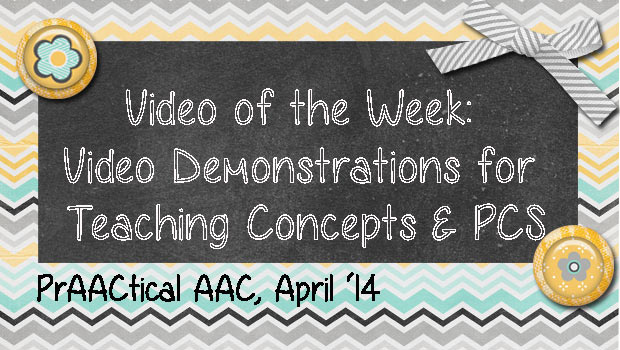
This week, we’re thrilled to feature a set of videos by Andrea Huist, who created them for an undergraduate honor’s thesis on teaching concepts and PCS symbols. They were posted by her mentor at Ohio University, Dr. John McCarthy. We are looking forward to more information about Andrea’s single subject experimental design study. Until then, enjoy using these great videos! Direct Link to Video Playlist: https://www.youtube.com/watch?v=TT91Ic1rxOM&list=PLGYr3j2I8_zMUMyShLSlbJcP0dSumJJNc
April 5, 2014
by Carole Zangari -
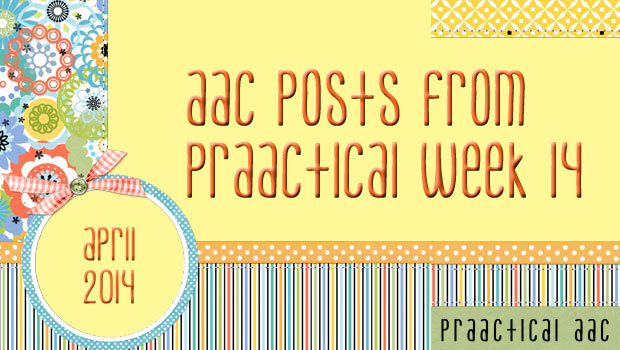
Hope your prAACtical week is going well! Sunday: Video of the Week – Connecting with Prelinguistic Communicators Monday: Strategy of the Month: Thoughts on Teaching Word Prediction Tuesday: 10 AAC Things to Do for Autism Awareness/Acceptance Month Wednesday: Watch It Wednesday – Music and Communication by Ryan Judd Thursday: AACtual Therapy – Supporting the Development of Early Grammar with Kimberly Ho Friday: 3 AAC Presentation Handouts You May Have Missed
March 31, 2014
by Carole Zangari -
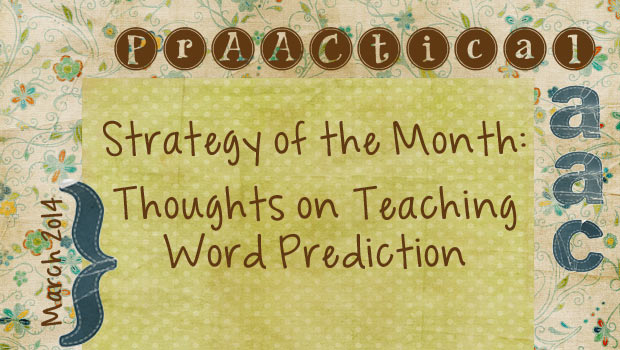
As we wrap up a month of AAC and literacy, let’s look at a strategy that spans communication, reading, and writing. Word prediction, as you know, is a strategy in which the learner begins spelling a word and the AAC device provides a word bank of possible options using a prediction algorithm. There are lots of kinds and levels of prediction, and the technology keeps getting better and better. Word prediction is built into most high tech SGDs, many text-to-speech apps, and some writing programs. In this post we consider some of the issues around using and teaching word prediction. Time and Effort Word prediction (WP) saves keystrokes, which is important for our prAACtical friends who have limited energy, poor endurance, and issues with fatigue. Does it save time? Not always, and there were some important studies that revealed this in the mid-1990’s. Of course, technology has improved a lot... [Read More...]
March 25, 2014
by Carole Zangari -
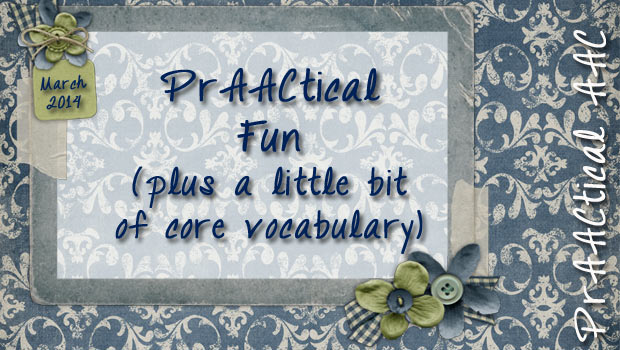
It was so gratifying so be at the most recent ASHA and ATIA conferences and notice how many presentations covered some aspect of core vocabulary. The shift away from noun-heavy, activity-based vocabulary has gained significant momentum. Teams who are deeply invested in teaching core words find that it becomes a way of thinking. Still, it’s not as easy as it seems to use core words. We found this fun site that we thought you might like, too. It challenges you to explain or discuss something using only the more frequent 1,000 words. Check out these examples, then try your hand at using core words to explain how to make a favorite recipe, explain what you did at work today, or teach a lesson. If someone can summarize a whole movie or doctoral dissertation with core words, shouldn’t we be able to model them when we speak to AAC learners throughout... [Read More...]
March 14, 2014
by Carole Zangari -
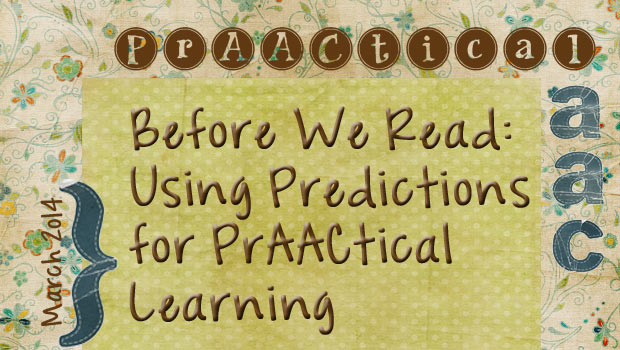
This month, we’re focusing on literacy learning for our Monday posts on Strategy of the Month. In honor of that topic, here’s a quick tip for adding a bit of interaction to book reading. This tip works for books you’ve never read before, or perhaps haven’t read in a really long time. Take a few minutes before the reading begins to predict what the book will be about. We’ll get to the ‘How To’ part in a minute, but first, here’s why we think this is a prAACtical idea. It gets AAC learners thinking about something more than requesting, and we know you are just as passionate about that as we are. It helps the AAC learner activate their background knowledge, something that (we’ve noticed) many of them don’t do automatically. That doesn’t mean that they aren’t capable of it, of course, but it does mean they need practice and... [Read More...]
February 5, 2014
by Carole Zangari -
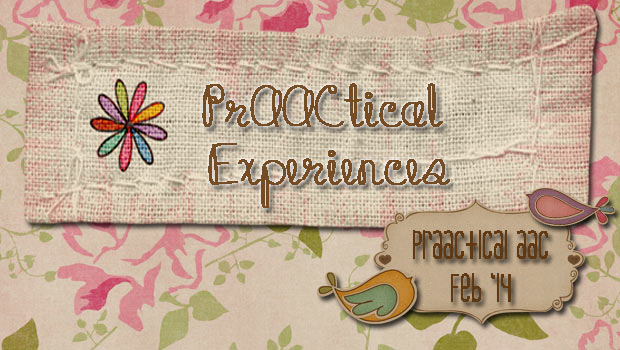
What do you wish you had known when you started providing AAC services? Awhile back, we posed this question on our Facebook page: “What are two things you wish you had known when you started providing AAC services?” The prAACtical responses got us thinking. Take a look. “The families need just as much training as the kids do.” Yup, and we’ll add something else to that. WE need training, too! We expect so much of ourselves, which is fine, but we also need administrators, agencies, and colleagues to realize that it takes a lot to keep up with changes in the science and technology. That doesn’t come cheap or easy. “Don’t be afraid to ask others in the field. They are so helpful for problem solving.” We couldn’t agree more. Most AAC professionals we’ve met have been incredibly supportive. Reach out to others in your area, through social media, and at... [Read More...]
January 30, 2014
by Carole Zangari -
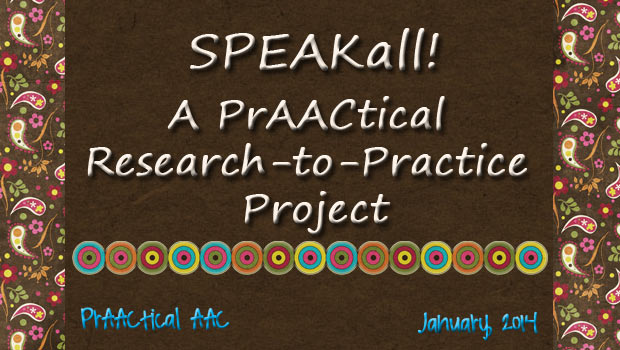
It is a pleasure to welcome back Dr. Oliver Wendt, who graciously agreed to give us an update on the SPEAKall! app designed by faculty and students at Purdue University. You can see the original post here. There is a proud tradition of AAC research at Purdue, and we’re delighted to see that their latest prAACtical contributions. :::::::::::::::::::::::::::::::::::::::::::::::::::::::::::::::: We wrote the first announcement about SPEAKall!, a therapy app for AAC in autism and developmental disorders, over a year and a half ago. SPEAKall! was originally created by the Purdue Program for Engineering Projects in Community Service (EPICS) in conjunction with the Purdue AAC Research Lab and the Purdue Speech-Language Clinic. SPEAKall! is specifically designed to start AAC intervention in prelinguistic learners. It has a very intuitive and “sensory-friendly” interface that reduces cognitive load, which makes it ideal for individuals with severe, non-verbal autism or severe developmental speech and language delay.... [Read More...]
January 20, 2014
by Carole Zangari -
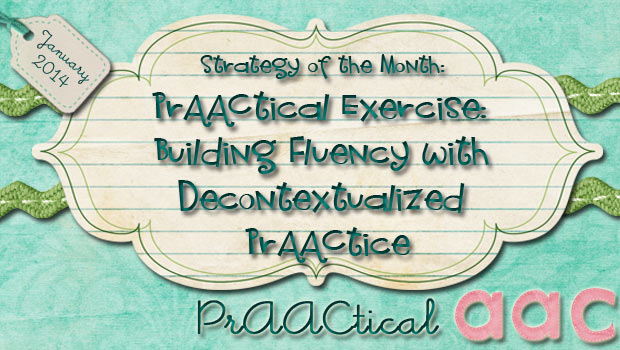
In most situations, communication teaching must be steeped in a meaningful context. SLPs build their plans for teaching new concepts or communicative intents around things that are relevant and important to the AAC learner. How do you teach ‘more’ without something the learner wants more of? How do you teach ‘fast’ without making something zip around? It just wouldn’t work. We get the role of context and have written many posts emphasizing the central part it must play in AAC intervention. Is there are prAACtical place for therapy activities that are NOT embedded in a rich semantic context? We think so. First, a word about what we mean when we talk about therapy activities that are decontextualized. We’re talking about activities in which there is not necessarily a connection between the semantics and the outcome for the AAC learner. (For example, saying a sentence with ‘more’ in it, does NOT... [Read More...]
December 31, 2013
by Robin Parker -
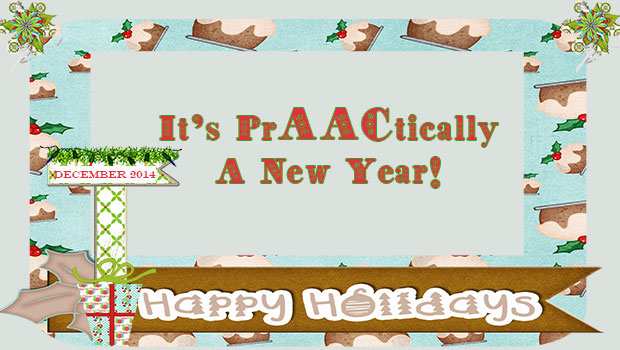
It is just about 2014. Hard to believe another year is finished and we are moving on once again. Our wishes for 2014 are for ALL Learners to have access to: Aided Language Input Communication Displays that meet their needs Role Models Presumed Competence Core Word Instruction Fringe Word Instruction Friends Many Meaningful Language Experiences Frequent Communication Opportunities Fun Learning Our Wishes for ALL SLP’s and Educators to have access to: An Exciting and Stimulating Personal Learning Network (PLN) Appropriate Goals and Strategies Meaningful Language Experiences Role Models Laminator and Laminator Materials Literacy Materials Core Word Highlighter Tools, Page Fluffers & Spacers, Apps for Learning Language An AAC Philosophy Fun Teaching
December 20, 2013
by Carole Zangari -
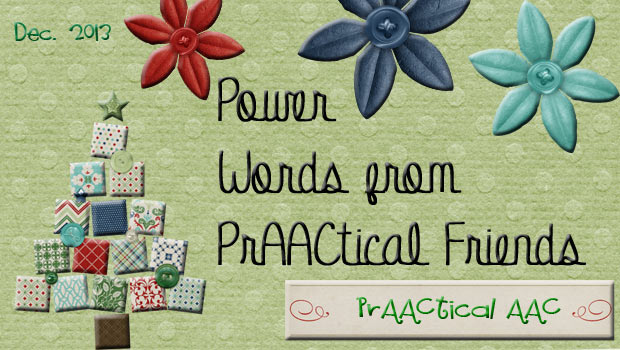
Teaching core vocabulary is the best way to pack a lot of power into an AAC system. As some of you know, we post things to the PrAACtical AAC Facebook Page a few times/day. Recently, we shared a link to a core word board from the I Can Newsletter folks that was posted on Boardmaker Achieve. We asked for suggestions for what you could say with those words. Here’s are some great ideas from our prAACtical friends: Come again: Love that this can be used in a literal sense, but also as a snarky comment Get help Go away: Language learning and self-advocacy – this one’s a two-fer! Your bad Stop it. Ready, go! Go get it. I like it. I want all done! I want more You do/did it. You stop it. You want it. What you want? We’ll take any opportunity to model questions and teach how to... [Read More...]









